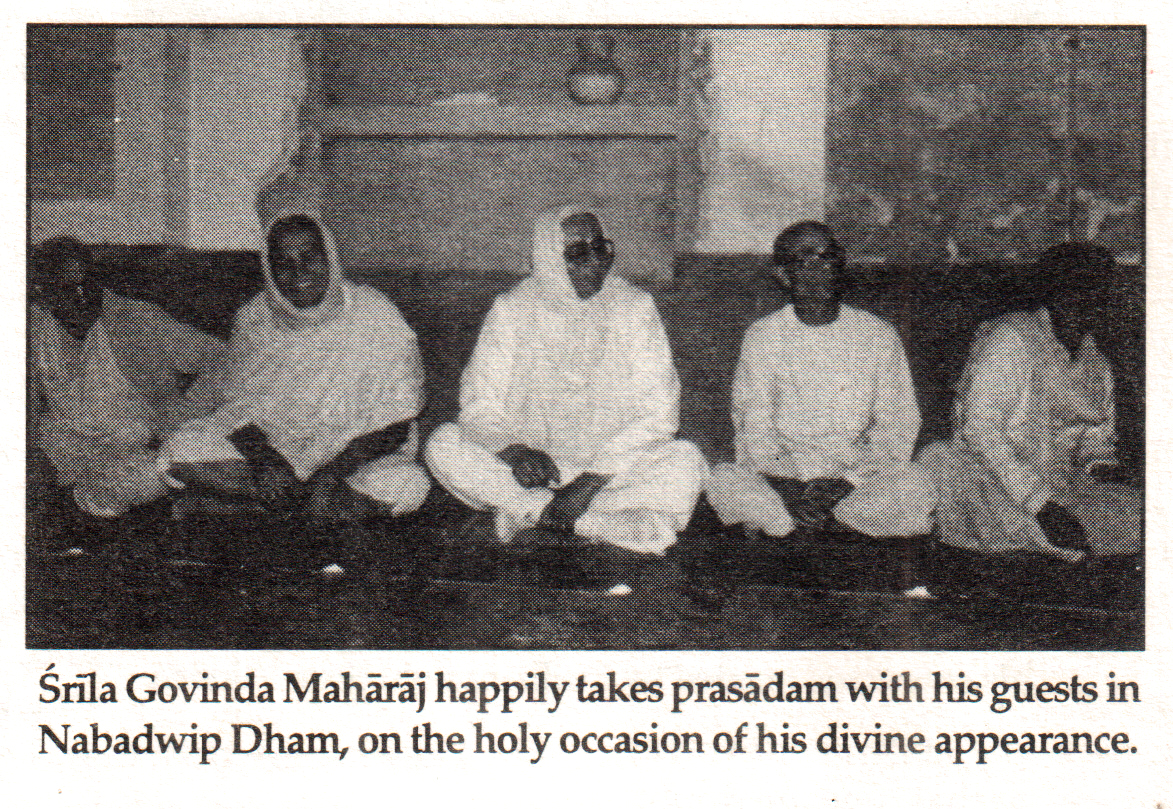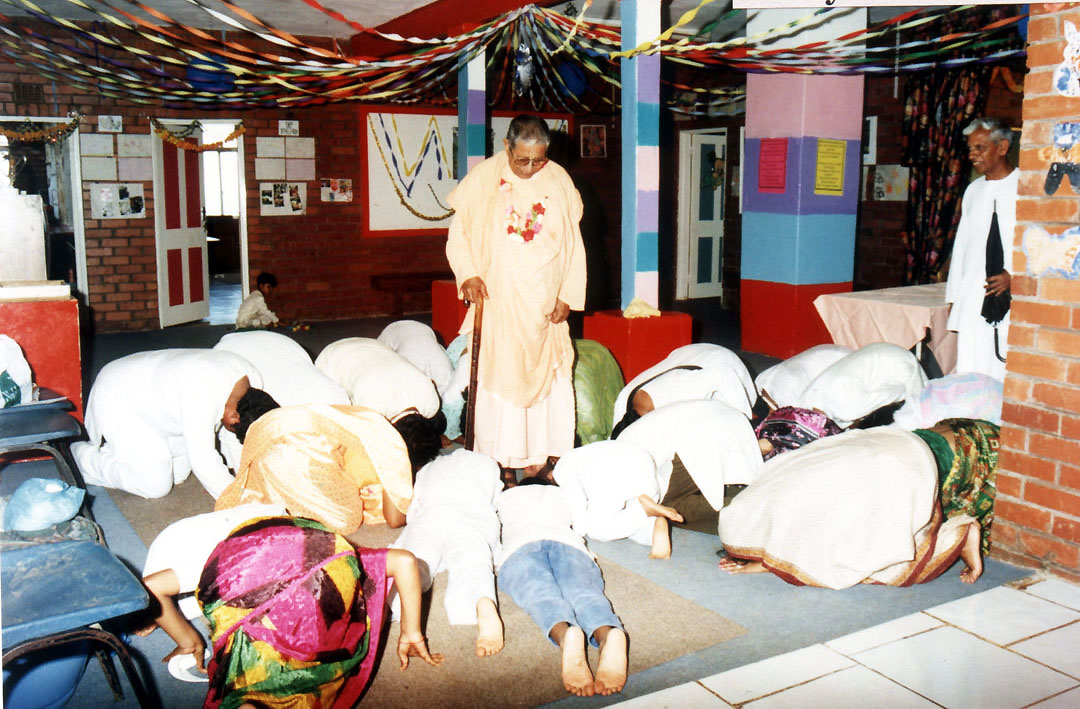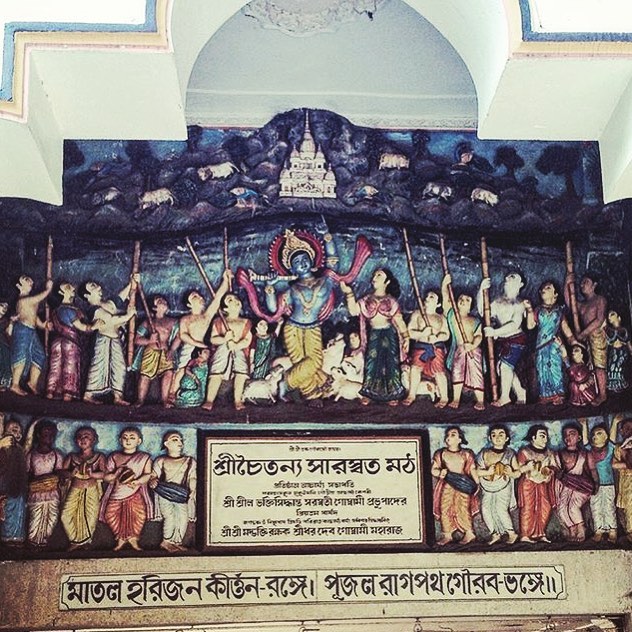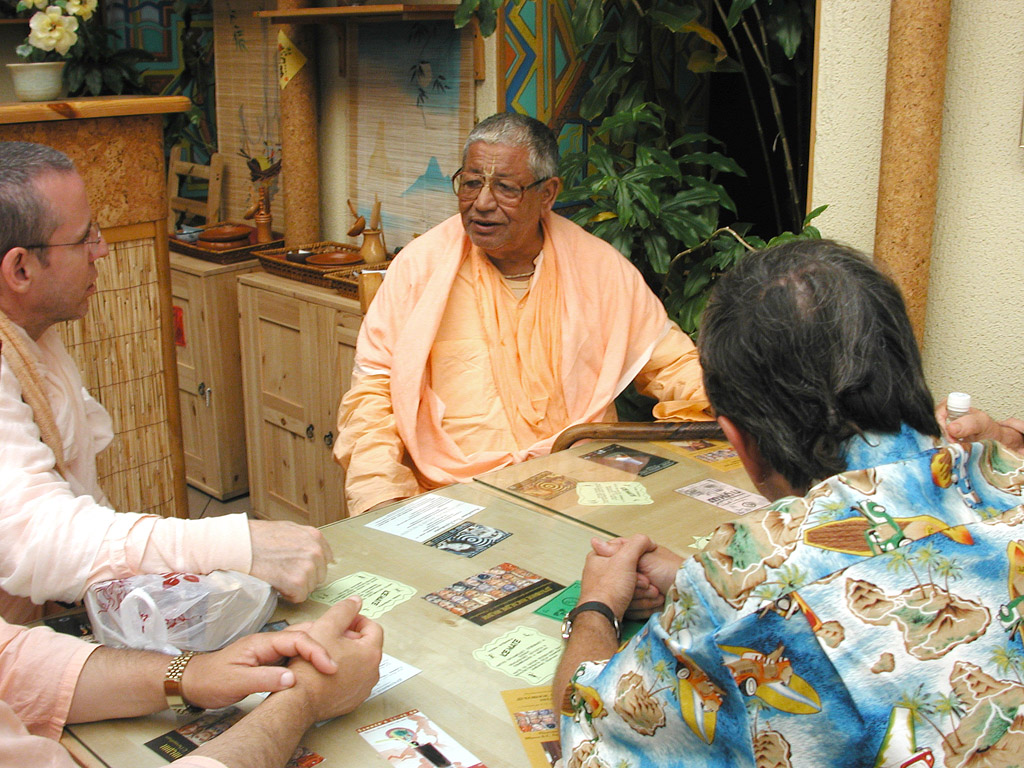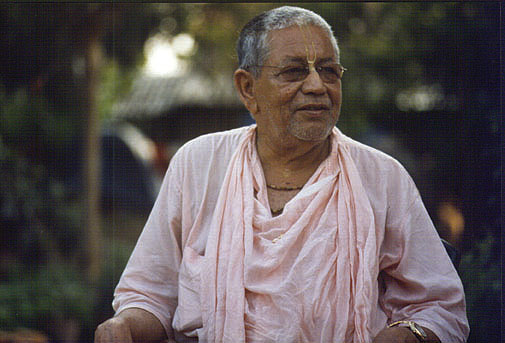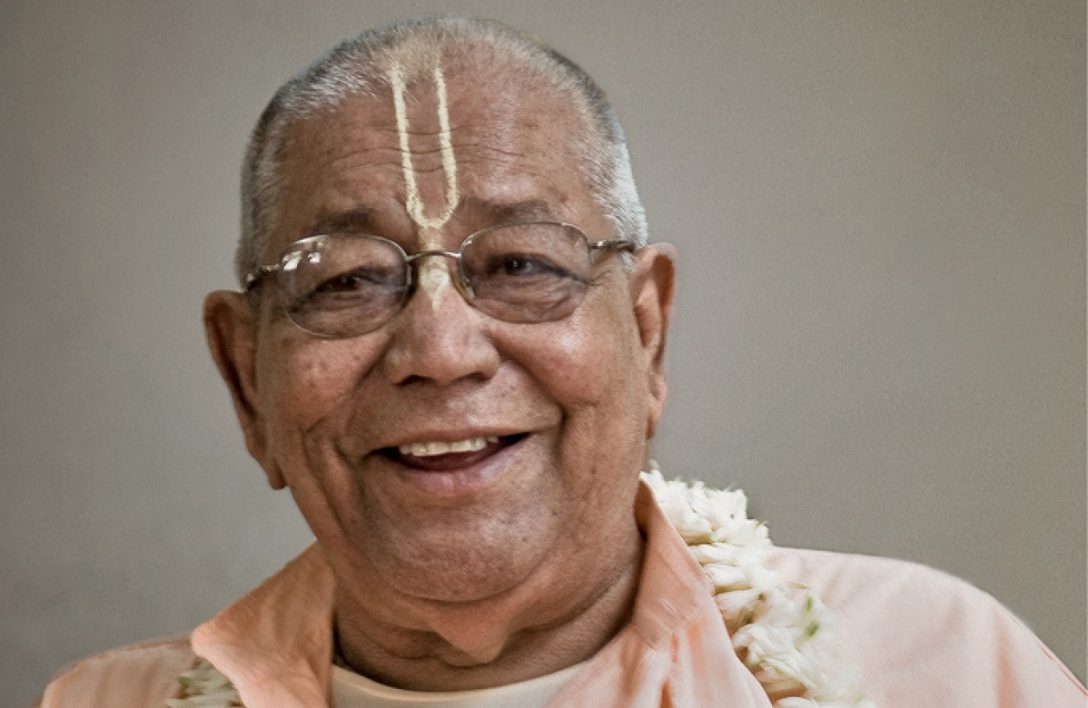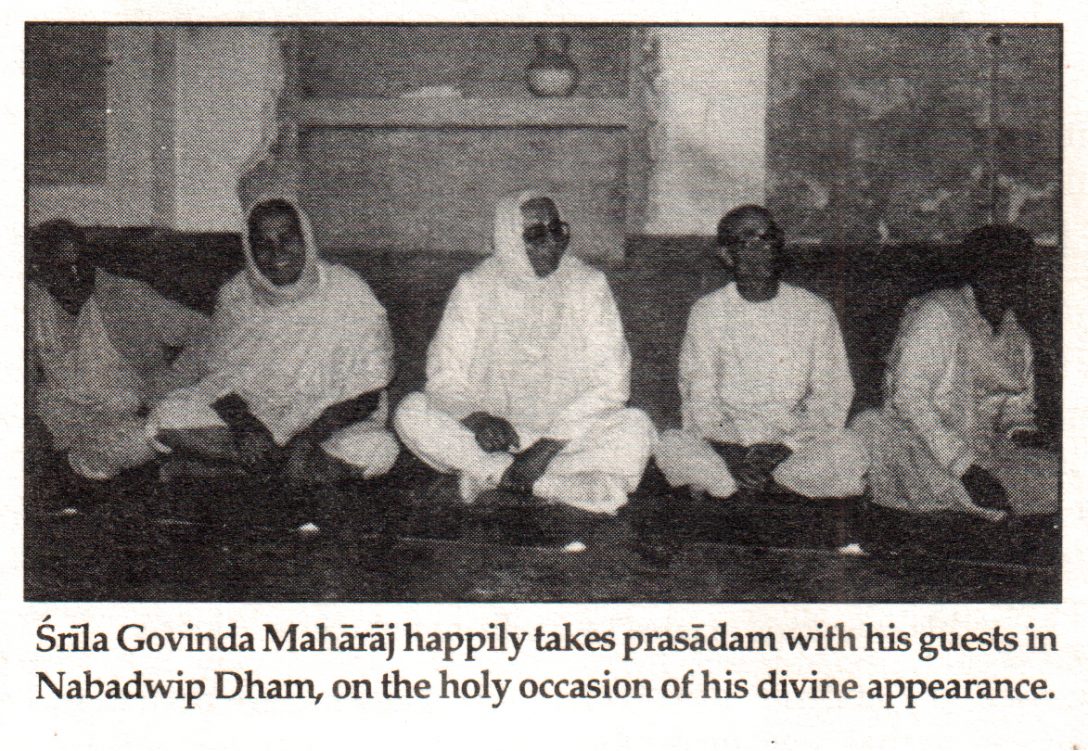Question: Everyone has some karma, and sometimes someone else’s karma is disturbing me. How can I understand when I should try to correct this other person’s karma? How can I know if it is correct or incorrect to try to modify another person’s karma? How can I understand how to act for my benefit and for the benefit of this other person?
Śrīla Govinda Mahārāj: Actually karma means action. It is the law of this material world, ‘To every action, there is an equal and opposite reaction’. This is Newton’s third law. As yet, no one has broken that law [laughter]. And there is good karma and bad karma. Good is what is giving us upliftment from the illusory environment to the transcendental plane. That is good karma. And there is some indication for that: what will be beneficial for everyone is good karma. And what is non-beneficial and what is harmful for others is called bad karma. Someone may be benefitted by that, but if it is breaking the society law, which has been made for the society’s benefit, we are considering that to be bad.
If our action, karma, will give us upliftment from the present level of the illusory environment to the transcendental plane, that will be very good karma. That is written in the scriptures. We see that there are so many religions in this material world within human society, but the target of all religions is to take us from a lower level to a higher level. And we can go up through our good karma. We see that indication within all religions. For that we are respecting all religions: all religions want our upliftment from this very lower level to a higher level. They are not only looking for their own benefit, but they are looking for the benefit of the human society, benefit of the dog society, benefit of the cow society, benefit of the plant society, even the benefit of the insect society: we can see that type of program within all religions. And we can practise that very easily if we follow this Kṛṣṇa consciousness.
If we follow Kṛṣṇa consciousness, then we can easily practise and go to a higher level. And there the process is this: humility, tolerance, and giving honour to others. This is the first conditional process. These three qualities will make the whole world our friend. My karma will be more pious, and my practising will be harmless. Otherwise, someone will kill some goat, someone will kill this, someone will do that. Sometimes it may not be harmful for me, but it will be harmful for others. I have seen that it is a law here that you cannot cut down a big tree. You cannot cut it, you must maintain it. We are practising Kṛṣṇa consciousness in this way.
Question: How can you recognise what is good and what is bad?
Śrīla Govinda Mahārāj: What is good for everyone is good, and what is bad for everyone is bad [laughter]. It is natural. But sometimes it happens here that we cannot understand that an activity’s result will be good in the future, though at present it looks bad. Then what will we do? Previously crystal sugar candy was the medicine for jaundice, hepatitis. It is written in the Ayurveda. But who has hepatitis will taste that sugar candy to be bitter, pittopatapta-rasanasya. When he first takes it, he will get a bitter taste, not a sweet taste. But finally it will give them their super benefit, and the disease will go out. Karma is also like that: we cannot always see that karma will give a sweet taste. In that case we must arrange a sugar coated pill, and then the disease will go out. For some persons the bitter is necessary, and for some persons sweet is necessary. But if the action will finally give a good result, then that karma will be good. If the final result will come good for everyone, that is good.
Pittopatapta-rasanasya: when we give them sugar candy, they will not feel that the taste is good. But finally it will cure them and they will taste the sweetness. But what is good for everyone and good for others is good karma. The colour may be a little different, and everyone will not feel it is tasteful. Everyone may not feel it is good, but for the patient it is necessary to give that type of karma to him, “Do this, do that.” It is not necessary for them to fully to understand, but according to their capacity they will take it.
Question: Does this mean that however it is coming we have to accept this medicine?
Śrīla Govinda Mahārāj: Yes, but the medicine must really be medicine and it will come from a doctor. Then that will be beneficial.
Question: Will the medicine have effect in a short time or long time?
Śrīla Govinda Mahārāj: It is depending upon the person, and depending upon the situation of the disease, and how much we are attached.
Spoken by Srila Gurudev during his visit to Italy in September 2000
Reference
syāt kṛṣṇa-nāma-charitādi-sitāpy avidyā-
pittopatapta-rasanasya na rochikā nu
kintv ādarād anudinaṁ khalu saiva juṣṭā
svādvī kramād bhavati tad-gada-mūla-hantrī
(Śrī Upadeśāmṛta, verse 7)
“The holy name, character, pastimes and activities of Kṛṣṇa are all transcendentally sweet like sugar candy. Although the tongue of one afflicted by the jaundice of avidyā [ignorance] cannot taste anything sweet, it is wonderful that simply by carefully chanting these sweet names every day, a natural relish awakens within his tongue, and his disease is gradually destroyed at the root.”
Tag: disturbance
Lord of the cows
“May that Lord of the cows be satisfied by us. Who is Indra when compared to Kṛṣṇa? Kṛṣṇa is the master of Indra. And yet He has appeared as the master of cows; the Supreme Absolute Truth has accepted a simple position as the keeper of cows. Superficially, He is a mere cowherd boy. But let that cowherd boy, who holds within Him the power of controlling the whole universe, be satisfied with us. We want to worship that Lord who has taken the humble position of the king of the cows.”
Excerpt from Loving Search for the Lost Servant by our Param Gurudev, His Divine Grace Srila B.R. Sridhara Deva-Goswami.
deve varṣati yajña-viplava-ruṣā vajrāśma-varṣānilaiḥ
sīdat-pāla-paśu-stri ātma-śaraṇaṁ dṛṣṭvānukampy utsmayam
utpāṭyaika-kareṇa śailam abalo līlochchhilīndhraṁ yathā
bibhrad goṣṭham apān mahendra-mada-bhit prīyān na indro gavām
(Śrīmad Bhāgavatam: 10.26.25)
The very gist of the Govardhan-līlā, the very substance of the Pastime, is represented in this verse. The milkmen in Vṛndāvan used to observe a sacrifice to satisfy the king of heaven, Indra, at whose command the rain, clouds, and other subtle elementary powers move. The main wealth of the cowherd men is the cow, and the cow’s main food is grass. Only rain can produce grass, and so the cowherd men used to perform sacrifice to satisfy the subtle power who is supposed to be in command of natural substances like rain.
By satisfying Indra, favourable rains would come and there would be sufficient grass. The cows could then graze easily on the grass and generate milk profusely. The gopas, the cowherd men and their families, used to make different preparations from the milk, sell them in the marketplace, and in that way earn their livelihood.
As the grazing ground in one place was finished, they would move from one forest to another. Only for the purpose of obtaining grass for the cows, Kṛṣṇa’s father Nanda Mahārāj and the cowherd men would wander from one place to the next. In this way, they lived sometimes in Vṛndāvan, sometimes in Nanda Grām, and sometimes in Gokul.
Once, Kṛṣṇa wanted to assert Himself and modify the worship of Indra. He wanted to establish His own domain, Vṛndāvan, in its pristine glory.
Although He was only a boy, He was a boy of extraordinary capacity. He was only seven years old. But in the Padma-purāṇa, it is said that the development or growth of special personalities is one and a half times that of ordinary persons. Although Kṛṣṇa was only seven years old by ordinary calculation, He was eleven according to general calculation.
Kṛṣṇa said, “Why should we perform this sacrifice to Indra? We have a direct concern with Govardhan Hill and not Indra.” He announced this idea to the gopas, and somehow, willingly or reluctantly, the gopas submitted to the advice of Kṛṣṇa. Nanda Mahārāj was influenced by affection for his son, and, because he was the king, he told them, “This time we shall worship Govardhan Hill and not Indra.”
Indra insulted
And so the gopas, the milkmen of Vṛndāvan, followed Kṛṣṇa’s advice—some reluctantly and some willingly—and they began the sacrifice for Govardhan Hill. This news reached Indra, who thought to himself: “A boy of special capacity lives there. Now He has taken the leadership of Vṛndāvan and stopped this ancient sacrifice to me. For a long time it was the tradition of the gopas to perform sacrifice to satisfy me, and now one boy is the cause of stopping my sacrifice!” He was very much enraged. Indra ordered the clouds and the wind and the lightning to attack the residents of Vṛndāvan.
According to Vedic understanding, all the elements are personified. In ancient days, the Āryans and rājarṣis, elevated human beings and great sages, used to see everything as persons. They saw everything in a personal way. They thought of the creepers, the trees, and everything else in the environment as persons. They understood that they were all persons who, according to karma, are wandering through the different species of life.
Once, I was asked by a professor of biology about alternatives to Darwinian evolution. I advised him that evolution from consciousness to matter may be understood on the basis of Berkeley’s theory. Whatever we think of is really part of our consciousness. And consciousness means person. Everything that we may be conscious of is a person. We may think of the wind as an inanimate object, but it was thought of in the Vedic line as a person. Lightning, wind, clouds, and rain are all persons. Whatever we consider to be elementary matter, gross and subtle, was all considered by the ancient seers of the truth to be persons.
Indra commanded the wind, the clouds, and the rain to go and devastate the whole area of Gokul Vṛndāvan. “The residents of Vṛndāvan have insulted me!” He said. “They have rejected me, have stopped worshipping me, and are instead worshipping that mountain, that hill of Govardhan. I can’t tolerate this insult! Go and devastate them.” By the order and wrath of Indra, the master of all the higher subtle elements, heavy rain began to fall. And so thunder, hail, and rain simultaneously attacked the whole of Vraja Maṇḍal.
Consequently, all the residents of Vṛndāvan were thrown into a great disaster. Misery, pain, and sorrow afflicted the animals and the protectors of the animals, the gopālas. So, the helpless—the women, children, and animals of Vṛndāvan—had no alternative but to take refuge of Kṛṣṇa. They all came to Kṛṣṇa for relief. They cried, “O Kṛṣṇa! Now what are we to do? You influenced us to stop the sacrifice meant for Indra, and now Indra, being vindictive, has begun to afflict us in this very heavy way. How can we live? Please save us!” They all came to Kṛṣṇa for protection. Seeing this, Kṛṣṇa had much pity for them. Being merciful upon them, He smiled a little, thinking, “They have all come to Me for relief.”
At that time, with only one hand Kṛṣṇa lifted up the Govardhan mountain. For Him, it was a very easy thing; with only one hand, He uprooted the hill and lifted it up as a child lifts a toy ball. And holding up that great mountain, Kṛṣṇa gave protection to all those who were living in Gokul. The men, women, and children of Vṛndāvan brought the cows and all their worldly goods and took shelter beneath Govardhan Hill.
The whole cowherd society was given shelter under that hill. In this way, by lifting Govardhan Hill, Kṛṣṇa gave protection to the residents of Vṛndāvan, and crushed the pride of the lord of heaven, Indra himself.
And so Nanda Mahārāj prays in this verse, “May that Lord of the cows be satisfied by us. Who is Indra when compared to Kṛṣṇa? Kṛṣṇa is the master of Indra. And yet He has appeared as the master of cows; the Supreme Absolute Truth has accepted a simple position as the keeper of cows. Superficially, He is a mere cowherd boy. But let that cowherd boy, who holds within Him the power of controlling the whole universe, be satisfied with us. We want to worship that Lord who has taken the humble position of the king of the cows.”
From this verse of Śrīmad Bhāgavatam, we can understand the position of the Lord’s Pastime at Govardhan. It is also described here that when the Vraja-vāsīs worshipped Him and engaged in sacrifice for His satisfaction, they saw Govardhan Hill as the Supreme Person, extending His hands, accepting the things offered to Him, and feeding Himself.
At that time, Kṛṣṇa pointed out, “You see! You thought that Govardhan Hill was only a heap of stone. No—it is living, it is the Supreme Personality of Godhead.” At that time, Kṛṣṇa revealed Himself as Govardhan Hill and showed how it is also His extended self. According to authorities in our line, Rādhā Kuṇḍa is the extended self of Śrīmatī Rādhārāṇī, and Govardhan is the extended self of Kṛṣṇa. And so we worship a stone from Govardhan Hill, a part of Giridhārī, as Kṛṣṇa Himself. We may understand from this that a part of the infinite is infinite. And yet so feeble is our ordinary vision that although Govardhan-śilā is a part of the infinite, and therefore also infinite, to our material vision it is only a piece of stone.
This Pastime shows that a thing may appear to be ordinary stone, but its possibility is infinite. In the general sense, Einstein’s theory of relativity has announced that anything we see is that thing plus something more. In his own scientific way, he explains that the reality of a thing includes its possibilities, its prospect—reality is not at a standstill.
Reality is not limited to what is seen or conceived by our senses. Our vision or estimation of anything may be limited, but unknown to us, its prospect may be unlimited. Everything has infinite possibility. We do not even know what infinite possibility a particle of sand may have. We do not know what sort of possibility may exist within a leaf of a plant. It may appear ordinary, but it may contain invaluable medicinal properties.
God the beautiful
A part of the infinite is also infinite. The Govardhan-śilā represents Kṛṣṇa as the master and keeper of cows. Within Govardhan is that mild and soft conception of God the beautiful. We beg for His mercy, His affection, and His gracious glance upon us.
That may save us from the negative influence of this material environment. When we try to put a stop to our material form of life and take our course towards Godhead, Kṛṣṇa consciousness, neglecting the imperative duties that are upon us, so many difficulties may come to trouble us, to trap us in our journey towards the ultimate truth. But if we stick to the order of Kṛṣṇa, He will protect us. Kṛṣṇa confirms this in Bhagavad-gītā:
sarva-dharmān parityajya mām ekaṁ śaraṇaṁ vraja
ahaṁ tvāṁ sarva-pāpebhyo mokṣayiṣyāmi mā śuchaḥ
He says, “Abandon all other conceptions of duty and just surrender unto Me. Have no fear. I shall protect you and free you from all sinful reactions that might arise from neglecting your ordinary duties.”
Different material tendencies and mental impulses may attack us—even Indra himself, the king of heaven and the controller of all ordinary activities, may attack us—but if we are attentive towards our goal, if we are careful to read the order of Kṛṣṇa, He will protect us in the shade of His lotus feet. He will give us shelter under the shade of Govardhan Hill, where no Indra will be able to touch our heads. And with full faith that Kṛṣṇa will give us protection, we should try to take shelter under Govardhan Hill and pray: “O Kṛṣṇa, give me protection from all the difficulties that may come to attack me because of my leaving behind my ordinary obligations.”
Although many anomalies may try to catch us, Kṛṣṇa will protect us. And in His representation as Govardhan Hill, that wonderful master of the cows will save us from all sorts of difficulties. How is this possible? God works wonders. His ways are unknown and inconceivable.
The sweet struggle
Before producing a child, labour pain will come to the mother. But the mother happily wants to tolerate that labour pain. Every mother knows labour pain is very heavy, but again they want to produce a child. Then pain is not always very painful in the heart.
When you take shelter of Srila Guru Maharaj you will have no fear from anywhere. You must get the right path and you must proceed in the right way. Some disturbance may come to us sometimes, and it is natural in this mundane world.
You know that verse,
uttiṣṭhata jāgrata prapyo varān nibhodhata
kṣurasya dhārā niśitā duratyayā
(Kaṭha-upaniṣad: 1.3.14)
The bhakti path is a very happy way to go to Krishna, but on either side, crossing over this māyā, illusory environment, are very dirty things. And something must come to us. Without pain how will we get the real thing? If we get it easily we will not understand what we have got. Before producing a child, labour pain will come to the mother. But the mother happily wants to tolerate that labour pain. Every mother knows labour pain is very heavy, but again they want to produce a child. Then pain is not always very painful in the heart. Sometimes it is coming, no doubt: we are living in this mundane world, and it is a disturbful world. Here everything is always disturbing us. But we are under the guidance of our Guru Mahārāj. If we take shelter then we have no fear. We must come out of the illusion if we are surrendered. That is the one qualification necessary: sincerity and full surrender. That is enough for us.
Srila Gurudev speaking in Malaysia, 24 January 1993.
The real solution: change yourself
The positive and progressive response to the challenges we face.
3 mins mp3 audio file
Krishna Kanta Didi: the fire of self-sacrifice
“Sometimes we are very enthusiastic but we don’t have a clear idea of what service is: we come to Krishna consciousness with our own conceptions and we try to apply our own ideas of what is ‘good’ and what is ‘spiritual’. When we engage in very deep service, we take all these misconceptions with us, and if we don’t leave them they will take us away, and we will go behind them. If those misconceptions don’t get burned in the fire of sacrifice and we don’t get to the proper conception of service, then we may decide that this is not what we expected and just want to leave. I’ve seen this happen sometimes.
“If you live in your house and chant your mantra you can live very peacefully, but when you do some active service like preaching then so many obstacles will come, from the environment and from within yourself, because the purification of the heart is starting in a serious way.”
—Krishna Kanta Devi Dasi
mp3 audio
The Absolute Truth must be sought out through a real process; otherwise we shall go the wrong way and then say, “Oh, there is nothing here; it is not real.” So, only if we follow this real process of understanding the truth will we experience the real nature of divinity.
(Sri Guru and His Grace, chapter one)
Our practice, our advancement, needs all these difficulties. Otherwise we may not know what is progress and we will become hypocrites, and give the same adulterated thing to others. So, to purify ourselves it is necessary that so many disturbances come.
(Sri Guru and His Grace, chapter five)
So, what is service proper? Hegel’s philosophy is “die to live”: dissolve your ego as it is at present. Dissolve it mercilessly—die. Die means to dissolve, mercilessly. Throw yourself into the fire and you will come out with a bright self. Learn to die as you are: that mental concocted body, that concocted energy. Take the Name of the Lord and die. Bhakati-vinoda aja apane bhulila. Forget yourself as you are at present, and you will find your proper self there that does not die. Death is ordained for our existence, so give to the death that part of you that is ordained to die, and the eternal part of you will remain.
(Sermons of the Guardian of Devotion Vol IV chapter five)
Spiritual discovery
If we have a body then some order and some disorder must be there. It is a reactionary world, and so reactions always come and we cannot avoid them.
nṛ-deham ādyaṁ su-labhaṁ su-durlabhaṁ
plavaṁ su-kalpaṁ guru-karṇadhāram
mayānukūlena nabhasvateritaṁ
pumān bhavābdhiṁ na taret sa ātma-hā
(Srimad Bhagavatam: 11.20.17)
[The human body, which can award all benefit in life, is automatically obtained by the laws of nature, although it is a very rare achievement. This human body can be compared to a perfectly constructed boat having the spiritual master as the captain and the instructions of the Personality of Godhead as favourable winds impelling it on its course. Considering all these advantages, a human being who does not utilise his human life to cross the ocean of material existence must be considered the killer of his own soul.]
This body is like a boat floating in the river, and it has given us the opportunity to be 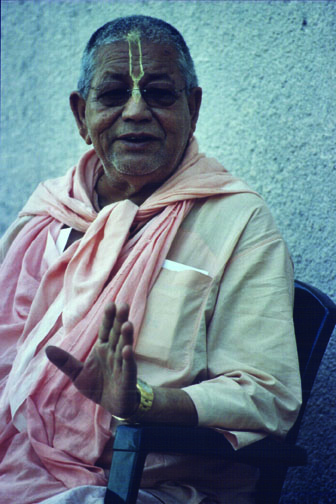 guided in the consciousness of Krishna by a good captain. In the river there are so many waves and so many obstacles, and many things are possible, but a good captain can take us the proper way, and we must be submitted to that captain.
guided in the consciousness of Krishna by a good captain. In the river there are so many waves and so many obstacles, and many things are possible, but a good captain can take us the proper way, and we must be submitted to that captain.
We are fortunate that we have this form of open consciousness. Trees have consciousness, but it is suppressed. Plants have consciousness, mountains have consciousness, but it is suppressed consciousness. Animals, insects, and so on have a little open consciousness. But our consciousness is more open and with the three qualities of willing, feeling, and thinking. We can proceed, we can feel, we can think, and through that so many discoveries in this world have happened. We can divide those in two ways: one is spiritual discovery, and another is material discovery.
Scientists are making material discovery, but the rishis and munis have made so much spiritual discovery and that has been recorded. Through them we can understand that a spiritual world is existing, and it is different from this material world. Our form is actually spiritual, it is not material.
We are trying to promote ourselves from the material to the spiritual plane. It is depending upon a person’s devotion or dedication. Through dedication we will get the help of an elevator. Some persons go up step by step and some persons go by elevator, standing in one place. Fortunate souls get that help. In this way everything is moving.
We are fortunate that we have got this human body. We do not know where we will go after death, because we cannot avoid our reactions. If we put too much salt in our food, then we will suffer, and if we put too much sugar that will also be the cause of suffering. Then as proper and as appropriate we will try to proceed.
Spoken by Srila Gurudev in Italy, September 2000, during his Sixteenth World Tour.
The pillar of success
“Failure is the pillar of success.” This is an English phrase. “Failure is the pillar of success.” If I try I must get the success pillar. One time I fall down, and then for all time I will sleep? No.
Whatever is considered good and whatever is considered bad in this mundane world—everything is bad here. Maybe that is affection, or maybe that is enviousness. Maybe that is apparently good or bad, but everything is bad.
‘dvaite’ bhadrābhadra-jñāna, saba — ‘manodharma’
‘ei bhāla, ei manda’, — ei saba ‘bhrama’
(Sri Chaitanya-charitamrta: 3.4.176)
[“In the material world, conceptions of good and bad are all mental speculations. Therefore, saying ‘This is good’ and ‘This is bad’ is all a mistake.”]
Srila Kaviraj Goswami expressed this very nicely. And Krishna very simply said,
mātrā-sparśās tu kaunteya śītoṣṇa-sukha-duḥkha-dāḥ
āgamāpāyino ’nityās tāṁs titikṣasva bhārata
(Srimad Bhagavad-gita: 2.14)
[“O son of Kuntī, the engagement of the senses with their objects produces the sensations of cold, heat, pleasure, and pain. But these effects are temporary—they come and go. Therefore, O Bhārat, you must endure them.”]
“It will come to you and you try to tolerate it. Don’t be foolish and don’t be hopeless.”
Hope is always in my front. We are seeing that now Krishna consciousness has spread all over the world by the mercy of our Gurus. It is not a lie; everybody knows now. Krishna consciousness is spreading all over the world, and how is it possible? Five hundred years ago, or maybe less than five hundred years but around four hundred and seventy years ago, Mahaprabhu said,
pṛthivīte āchhe yata nagarādi-grāma
sarvatra prachāra haibe mora nāma
“All over the world people will chant the Hare Krishna mahamantra.” And a hundred years ago Srila Bhakti Vinod Thakur said that in Mayapur the Western devotees and Eastern devotees will dance and chant together in Nabadwip Dham. And we see that that is happening. Where is the lie? It is true, we can see that. Then we must follow their directives.
“Chant Hare Krishna” is only the primary teaching of Mahaprabhu. It is the primary teaching. After that there will be many things and we must face those tests. When we get the seed of the bhakti lata [creeper of devotion] we must protect that bhakti-lata-bij. Then nobody can check our fortune. Sometimes some blowing wind will come and give us some disturbance, but without disturbance how will our heart become strong? If you do not exercise then your body will not be strong. If you stay the same way from your birth, if you do not play with your hands and legs then your body will not become strong.
“Failure is the pillar of success.” This is an English phrase. “Failure is the pillar of success.” If I try I must get the success pillar. One time I fall down, and then for all time I will sleep? No. And what fault is there? I am a faulty person, I am a fallen soul, we are always saying, “I am fallen soul”. Then if I am always fallen, what loss do I have? What I practise, that is my gain. In this way we must proceed to our destiny.
Srila Gurudev speaking in Govardhan, March 1991
This is a continuation of the post ‘Falling down, getting up’.
Falling down, getting up
We have attachment with this mundane world and with our body; it must be, because we are fallen souls. But we promised our Guru, “I must practise Krishna consciousness.” Taking diksa [initiation] means a promise, “I promise Gurudev, I promise Mahaprabhu: yes, any circumstance may come to me, but I will not leave your lotus feet.” And you have still not left: you are running, but only wake up from that illusion. You can see everything, and that is necessary. To always fall down somewhere is not good. Sometimes falling down is a possibility. And what loss is there? There is no loss. When a boy is running on the ground he will fall down on the ground. What loss does he have? He is not going underground; he will take help from the ground, and again he will run. This is the conception of Guru Maharaj, and not only Guru Maharaj: it is the conception of Srila Rupa Goswami Prabhu and Srila Sanatan Goswami Prabhu. They are the golden pillars of the sampradaya of Mahaprabhu.
My only shelter is your lotus feet. I may fall down, but will I sleep there?
Rupa Goswami Prabhu said,
bhūmau skhalita pādānāṁ bhūmir evāvalambanam
tvayi jātāparādhānāṁ tvam eva śaraṇaṁ prabho
“Oh Prabhu, you are my shelter. Tad api kila payodah stūyate chātakena. What shall I do? In the future, if I do not have your lotus feet I have no shelter. Then where shall I go? I cannot go to Brahmaloka [plane of non-differentiated spirit] and I cannot go to Svargaloka [plane of heavenly enjoyment]: my satisfaction is not there, my end is not there. My only shelter is your lotus feet. I may fall down, but will I sleep there? It is not possible. I am a living entity, a jiva-soul. I have willing, I have feeling, I have thinking. This is my property, and with that property I shall worship your lotus feet.”
What happened, happened. We don’t care.
Service to the Vaishnavas, and service to Guru is our only life’s goal. Then, what happened, happened. We don’t care. What have we seen? Many big, big rishis and big, big munis are sometimes falling down. But they are not completely attached with that environment. Vishvamitra Rsi also fell down. Sometimes willingly, sometimes unwillingly. Sometimes they willingly fall down. But our shelter is not there, our shelter is the lotus feet of Krishna. That is our only shelter.
You know everything, and that is the problem. That is why your heart is not satisfied with anything else. I have so much love for everybody, especially yourself. You know that love. When you come I feel it is my own atma, my own soul coming. That is how I see you.
It is not necessary to abuse anybody. We will only think, “My fortune gave me that type of environment and I fell down there. But I will not stay there forever.”
Everything belongs to my Gurus, and has been made by them, prepared by them. I can say that I am only mud, and they can make a Deity or make a dog.
I am the example. I am always telling to the devotees, I am the example. You know me. You see me, and what one Guru can do. I am looking at my Guru and I am surprised to see how it has come out. I am a very fallen soul, so how did my improvement come out this way, and not only in a very small way? When I consider that I get so much strength. That is why I sometimes say, defeat is not in my life. Victory is always with me, because Guru Maharaj is with me.
My body, my mind, my age, everything belongs to my Gurus, and has been made by them, prepared by them. I can say that I am only mud, and they can make a Deity or make a dog. They can make anything, but my position is like soft mud. I did not know anything when I joined with Guru Maharaj’s mission, but after that everybody gave respect, and why? Not for my qualification, but for my Guru Maharaj’s qualification. When everybody is giving me respect I am thinking, “Oh, it is Guru Maharaj’s respect, it is going to Guru Maharaj.”
Srila Bhakti Vinod Thakur said,
guru-jana-śire punaḥ, śobhā pāya śata guṇa
When anybody gives some respect, when anybody comes for service to Krishna I am thinking it is because of Guru Maharaj’s quality. By his mercy it is possible. And I have seen Guru Maharaj’s form, and how merciful Guru is.
Srila Gurudev speaking in Govardhan, March 1991
This talk is continued in the post ‘The pillar of success’
References
virachaya mayi daṇḍaṁ dīna-bandho dayām vā
gatir iha na bhavattaḥ kāchid anyā mamāsti
nipatatu śata-koṭir nirbharaṁ vā navāmbhas
tad api kila-payodaḥ stūyate chātakena
(Srila Rupa Goswami)
“O Friend of the needy, whether You chastise me or reward me, in the whole wide world I have no other shelter but You. Whether the thunderbolt strikes or torrents of fresh waters shower down, the chātak bird (who drinks only the falling rainwater) perpetually goes on singing the glories of the raincloud.”
ohe prabhu dayāmaya, tomāra charaṇa-dvaya,
śruti-śiropari śobhā pāya guru-jana-śire punaḥ,
śobhā pāya śata guṇa, dekhi āmāra parāṇa juḍāya
(Gītā-mālā: 1.1.1)
“O merciful Lord! Seeing Your feet become more beautiful atop the heads of the scriptures and a hundred times more beautiful atop the head of my Guru soothes my heart.”
The humility of Srila Jiva Goswami
We must always be humble. Maya will give many tests but we must try to tolerate everything and realise why such things are happening. Furthermore, if we want to remain peacefully we must give honour to others. If we do not disturb others but give honour to them, they will not disturb us. They will think, “This person is very innocent. He is not against me, furthermore he nourishes me by giving me respect, so I must not disturb him.”
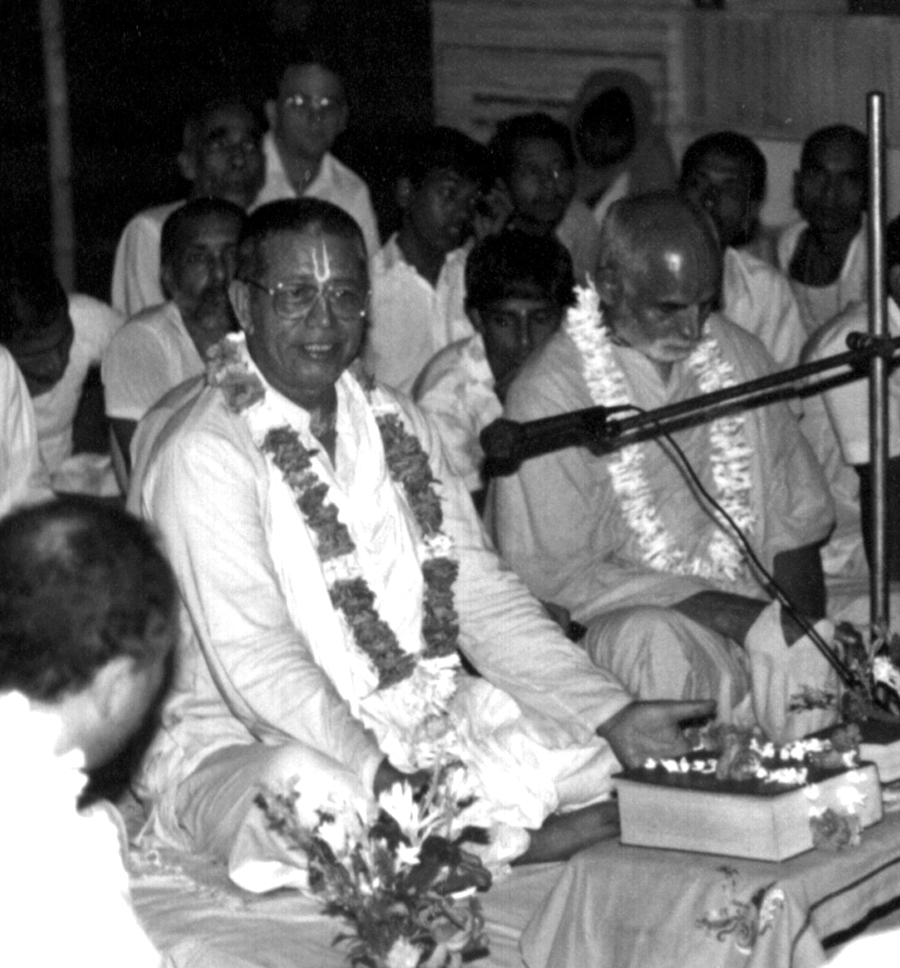
Mahaprabhu always wants that His devotees have peace in order to practise spiritual life. Such peace is only possible if the devotees are humble and tolerant, and if they give honour to others. The devotee will think, “I do not want to see whether someone is an honourable person or not, but I know my own position is that of an insignificant soul who is aspiring to be a servant of the servants of the servants of Krishna. So if someone wants any honour from me I must immediately give it to him and not give him any chance to think me to be an enemy.”
We can see an example in the Pastimes of Srila Rupa Goswami who was approached by a digvijaya pandit, a big world-renowned scholar. Hearing of Rupa Goswami’s name and fame he went to him and challenged: “If you cannot defeat me then give me your certificate by signing a statement that you have been defeated by me.”
Rupa Goswami thought, “I have no time to talk with that man.” He therefore asked, “Where is your paper? I shall sign it.” He then wrote to the effect that, “This man is a great pandit and I have been defeated by him,” and he signed it. This is the nature of the pure devotees, they do not want to cause disturbance or trouble to others. They are well aware that everything here is a passing show. People think that what they have is their wealth, but we neither know when we shall die nor where we shall go after death. Our duty is to prepare ourselves for the service of Krishna, and *that* is the real wealth of our lives. Our only shelter is to serve Krishna, therefore we do not want to waste our time with worldly affairs.
This is one mood of the devotees, and another is shown by Jiva Goswami Prabhu. He wanted to rectify that digvijay pandit, and therefore chastised him: “You went to see Rupa Goswami but you do not know who he is. You think yourself to be a great pandit, but now I consider you to be very foolish. You went to the ocean of ecstasy but you did not receive even one drop of that ecstasy. You went there but came back empty handed, therefore I consider you to be very foolish. You do not know who Rupa Goswami and Sanatan Goswami really are, therefore you went to defeat them. You have made a great offence to them. I am their disciple and if you want to examine me then go ahead, by which you may understand something of their greatness.” Anyhow, that digvijay pandit received the mercy of Jiva Goswami and was defeated by him within a few minutes. He could understand he had made much offence to Rupa and Sanatan, and, by Jiva Goswami’s mercy, he left his ego. The pandit immediately returned to Rupa Goswami and Sanatan Goswami and, apologising, took shelter of them. Jiva Goswami was happy that he was able to do some service to his Guru by rescuing this digvijay pandit from illusion.
Following this incident, Rupa Goswami, in order to teach us, showed some unhappiness towards Jiva Goswami: “You have come here to Vrndavan but now it seems through this incident that you want to acquire mundane fame.” This, however, was not the desire of Jiva Goswami, his intention was to glorify his Guru, correct the digvijay pandit, and bestow mercy upon him. This lesson is from one of the many incidents in the lives of our Acharyas.
Excerpt from Dignity of the Divine Servitor, compiled from the talks of Srila Gurudev.
Hopeful Vision
I see that Guru Maharaj is present and he is giving us inspiration in every work. I have no doubt. When I am in a little disturbed position, then Guru Maharaj is coming in front. At that time I am going to the front, with Guru Maharaj pushing me from my back. He is pushing me and I am going in the front. Now I see that Guru Maharaj is in my front and I am following him. Then I am more safe this way.
In this time, the middle time, many things have 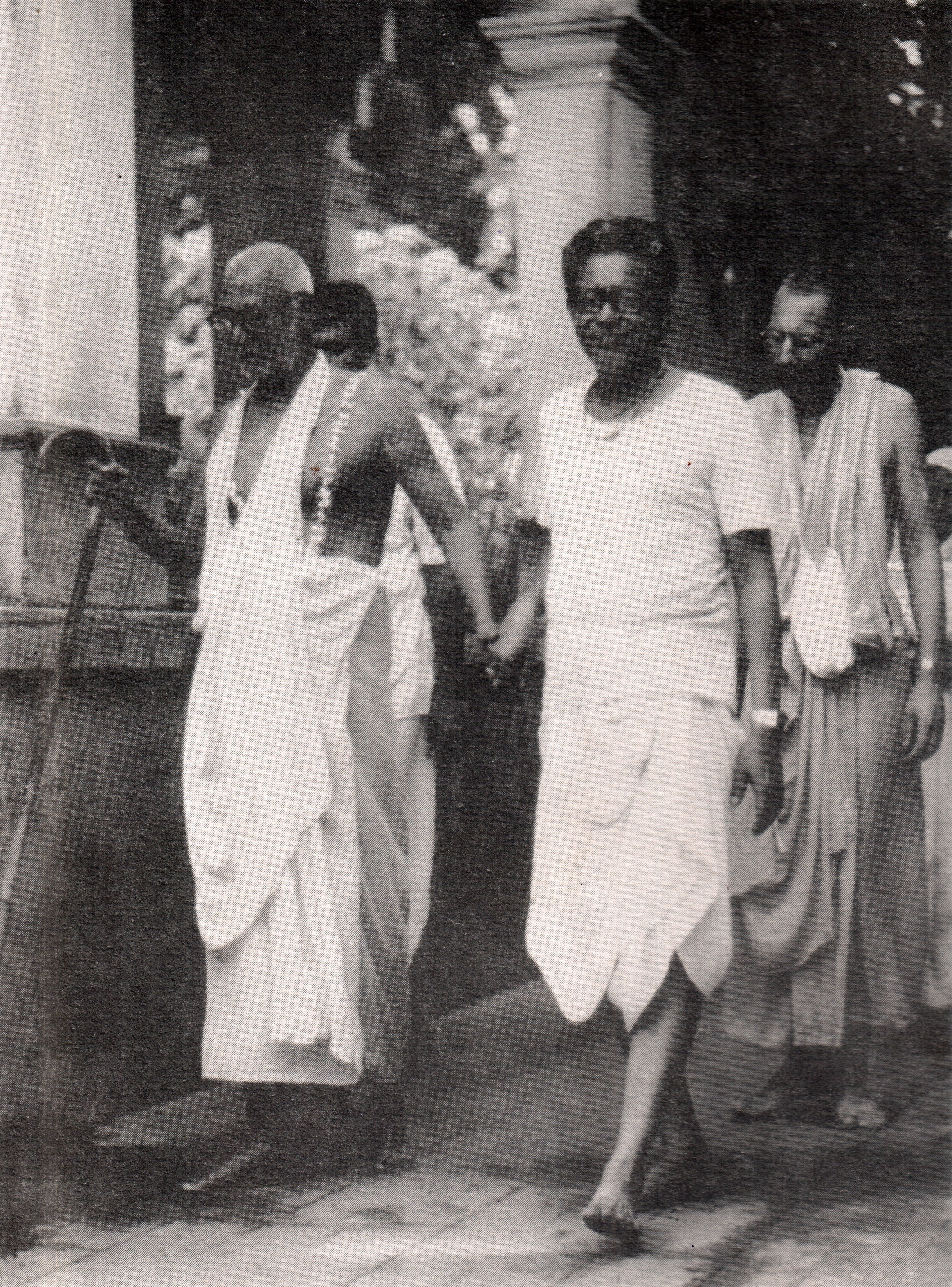 happened. Maybe all over the world many things have happened. I have heard that many things have happened. But all darkness will gradually go. Some things will go quickly, some things will go gradually. In this way everything will be set right, no problem. But when a great personality, a transcendental personality, leaves this mundane world, then some disturbance must come. From the beginning I told that we must be careful for disturbance, and we have seen this. But when we are fully surrendered to Guru Maharaj and want help from the upper level, and if we can pray properly, then help must come to us. I have no doubt. I am seeing it.
happened. Maybe all over the world many things have happened. I have heard that many things have happened. But all darkness will gradually go. Some things will go quickly, some things will go gradually. In this way everything will be set right, no problem. But when a great personality, a transcendental personality, leaves this mundane world, then some disturbance must come. From the beginning I told that we must be careful for disturbance, and we have seen this. But when we are fully surrendered to Guru Maharaj and want help from the upper level, and if we can pray properly, then help must come to us. I have no doubt. I am seeing it.
Srila Gurudev speaking on 10 October 1989, in Nabadwip Dham.
